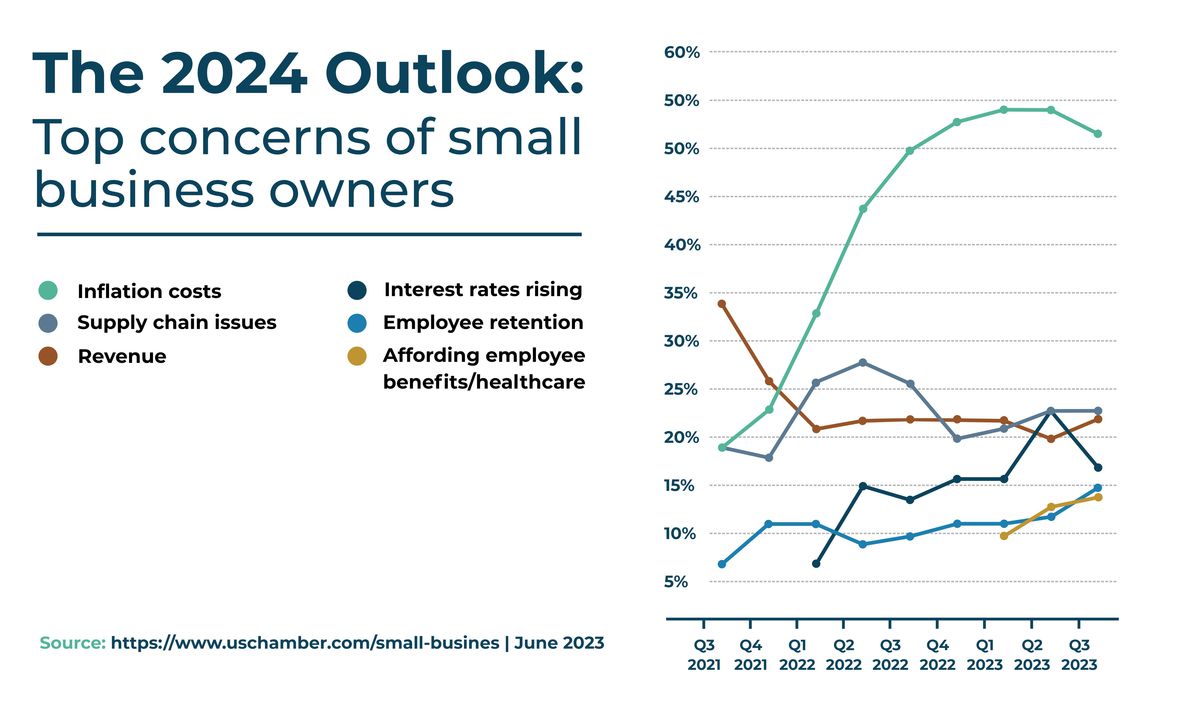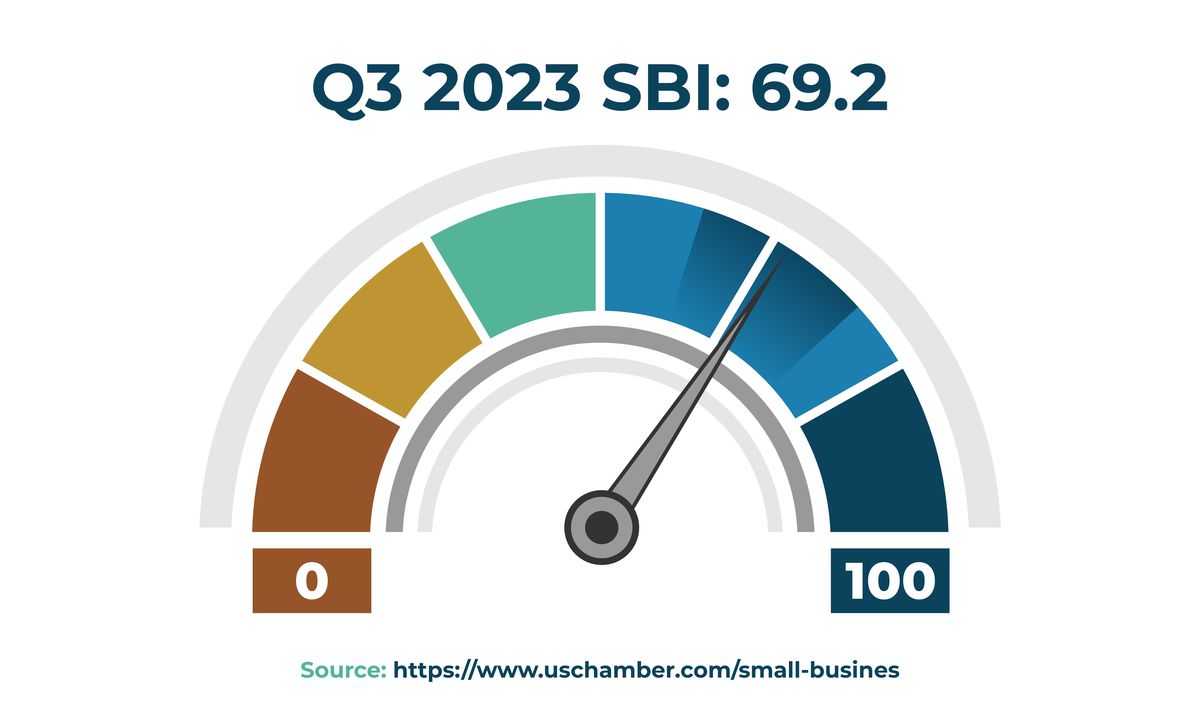As we approach 2024, small businesses are facing concerns like inflation, supply chain disruptions, labor shortages, and economic uncertainties. At iSWerk, we view these challenges as opportunities for growth. We are dedicated to providing innovative solutions that empower small and medium-sized businesses. Through our expertise in remote work, we help businesses succeed during tough times by supplementing them with tailor-fit strategies.
Table of Contents:
1 The 2024 Outlook: Top Concerns of Small Business Owners
2 Small Business Index Q3 2023 Report Highlights
3 The Significance of Remote Work and Offshoring
4 Top Trends in Remote Work and Offshoring to Optimize for in 2024
The 2024 Outlook: Top concerns of small business owners

- Inflation: A staggering 54% of small business owners have identified inflation as their primary challenge, significantly impacting their financial stability. The inflationary pressure has adversely affected the bottom line of 75% of these businesses over the past year.
- Labor Shortages: Labor shortages plague 62% of small businesses, straining their workforce management and growth plans. Because of widespread labor shortages, it’s been difficult for small businesses to find suitable people to fill open positions.
- Supply Chain Disruptions: Supply chain disruptions have hit 48% of small businesses, disrupting their operations and delivery schedules. These problems are especially dangerous for small businesses that depend on a small group of sources.
Small Business Index Q3 2023 Report Highlights

Small Business Index score for Q3 is 69.2. The Index score for Q2 was 63.1, according to The MetLife and U.S. Chamber of Commerce.
Since the COVID-19 pandemic began in early 2020, this has been the highest score, from the 63.1 score in Q2.
The score shows that small businesses feel better about the market and their chances for the future. However, persistent concerns about inflation remain around all-time highs.
Mental health is important to small businesses.
56% of small businesses say it's tough to meet the salary needs or expectations of their workers.
Concerns about other issues like keeping employees and being able to pay for their benefits have been slowly growing.
For example, small businesses are twice as likely to say that keeping employees is a big problem as they were two years ago—15% of small businesses said it was a problem in Q3 2021, up from 7% the previous quarter.
Similarly, 14% are worried about being able to pay for healthcare or employee perks, which is a big jump from the 10% who said the same thing in Q1 2023.
It’s hard for most small companies (56%) to meet their employees’ salary needs or expectations. Additionally, 52% of them are worried about problems maintaining employees because of stress or burnout.
Mental health is important to small businesses.
70% of small businesses say they are making mental health a priority for their employees.
The smaller companies are positive about the economy and their day-to-day operations, the more they seem to be focused on long-term improvements, especially keeping the right talent.
Some small businesses (52%) are worried that stress or burnout will make it hard to keep employees. A lot of these companies are actively helping their employees’ mental health and well-being by giving them access to tools.
This quarter, 70% of small businesses say that taking care of their employees’ mental health is one of their top priorities. This is more than the 60% who shared the same sentiments in Q3 2021.
Moreover, most of these small business owners or decision-makers are actively working to value the mental health of their employees, no matter where the business is located, how many people work there, what industry it’s in, or whether the owner is male or female.
The Significance of Remote Work and Offshoring

SMBs need to be agile and forward-thinking. Remote work offers flexibility and productivity, and offshoring provides access to global talent pools, optimizing costs. By embracing these strategies, businesses can enhance their efficiency and resilience.
Remote work and offshoring have become increasingly important for small businesses.
They can boost growth and efficiency, expand reach, and drive growth exponentially. According to a study, 73% of all teams will have remote workers by 2028. Offshoring can help small businesses reduce costs and access a global talent pool.
iSWerk can help small businesses leverage remote work and offshoring to achieve their goals.
Top Trends in Remote Work and Offshoring to Optimize for in 2024
To stay competitive, small businesses need to align their remote work and offshoring strategy with the latest trends.
Some of the 2024 top trends to watch out for and what small business should consider:
- Stay Competitive
Align remote work and offshoring strategy with 2024 trends for competitive advantage.
- Capitalize on Economic Growth
Leverage the expected 2.2% growth in the US economy to expand sales and operational horizons.
- Alleviate Rising Inflation
Invest in automation technology to curb costs, improve efficiency, and expand customer outreach amidst inflation.
- Navigate Supply Chain Challenges
Diversify supply chains and explore new markets to minimize the impact of disruptions and ensure smooth operations.
- Address Labor Shortages
Reduce dependence on manual labor by embracing automation, ensuring continued productivity in labor shortages.
iSWerk can help small businesses align their remote work and offshoring strategy with these trends to stay competitive.
Maximize Marketing Channels for Small Businesses in 2024

Some of the underutilized marketing channels that small businesses should explore in 2024 include:
- Social media
Leverage social media to reach new customers and engage with their existing audience.
- Influencer marketing
Consider partnering with influencers to promote their products or services.
- Podcasts
Explore advertising on podcasts to reach a highly engaged audience.
iSWerk can help small businesses maximize the potential of these marketing channels and avoid common pitfalls.
Conclusion
Small businesses face many challenges as 2024 approaches, including inflation, supply chain disruptions, and labor shortages.
Remote work and offshoring can help in overcoming these challenges and achieving their goals.
To remain competitive, small firms should also explore unused marketing avenues and keep up with the current trends.
iSWerk can empower small businesses to overcome these challenges and achieve success in 2024 and beyond.
